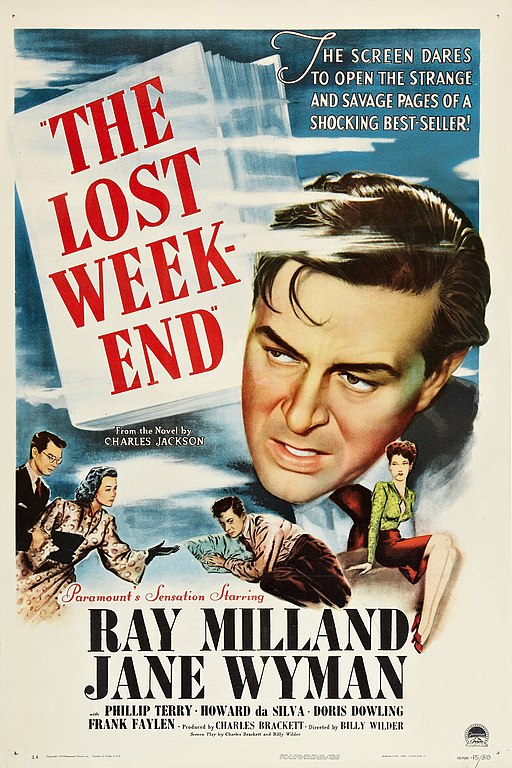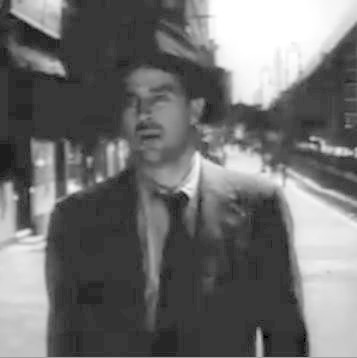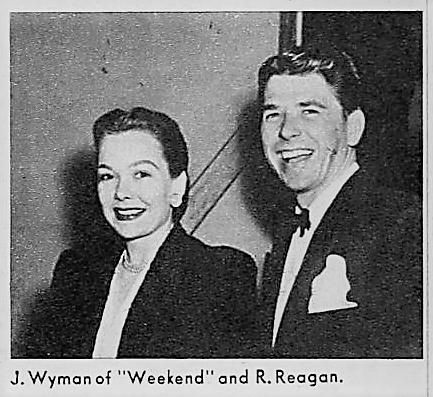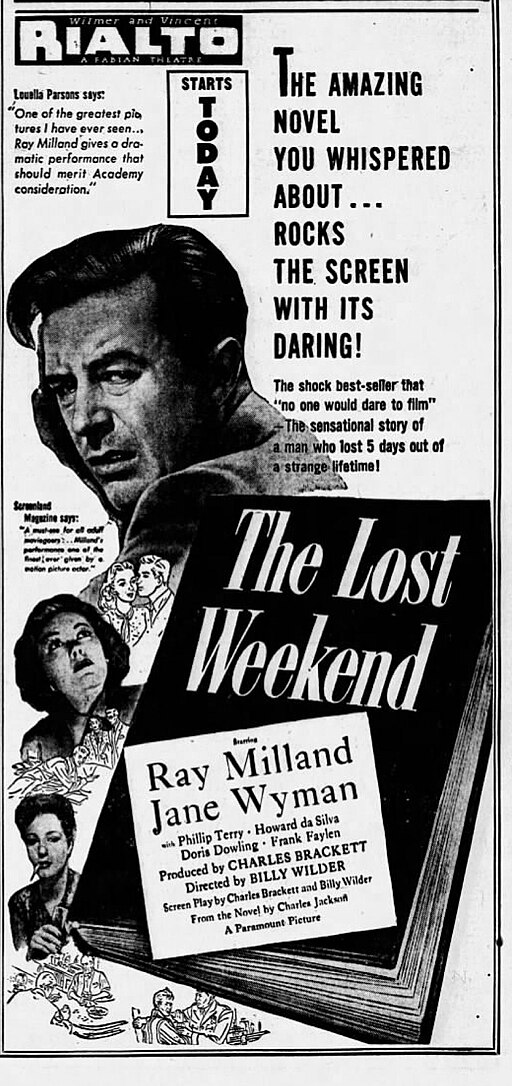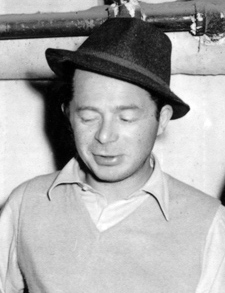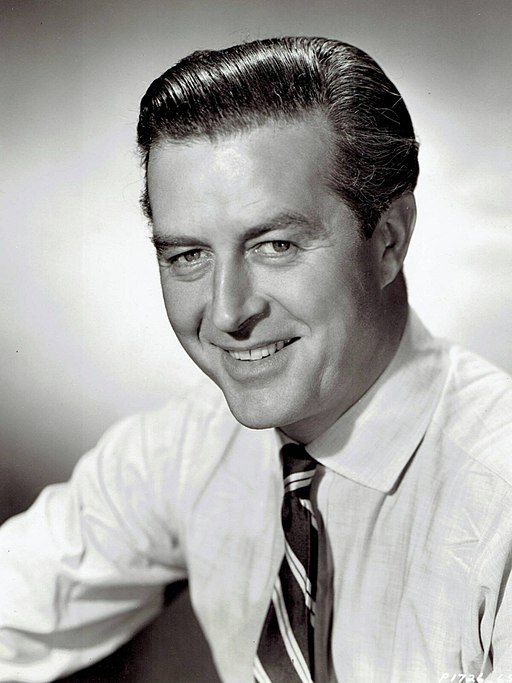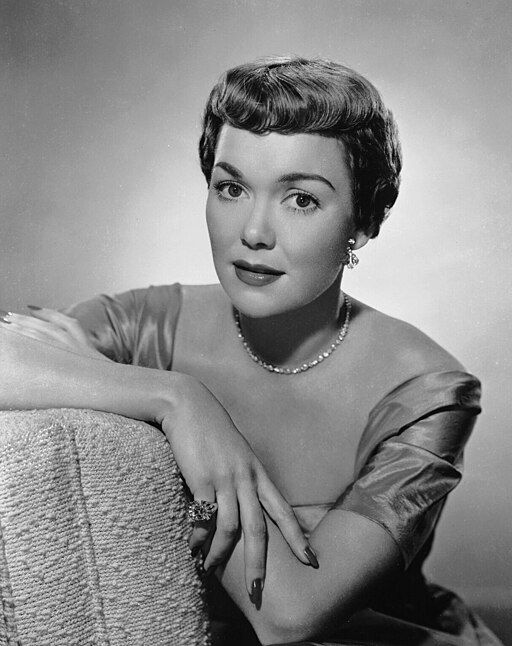The Lost Weekend - 1945
back| Released by | Paramount Pictures |
| Director | Billy Wilder |
| Producer | Charles Brackett |
| Script | Billy Wilder and Charles Brackett, based on the novel by Charles R. Jackson |
| Cinematography | John F. Seitz |
| Music by | Miklós Rózsa |
| Running time | 101 minutes |
| Film budget | $ 1,25 million |
| Box office sales | $ 11 million |
| Main cast | Ray Milland - Jane Wyman - Phillip Terry - Howard Da Silva - Doris Dowling |
The Lost Weekend
A harrowing portrayal of the struggles of alcoholism
"The Lost Weekend" is notable for its time due to its unflinching portrayal of alcoholism. It won several Academy Awards, including Best Picture, Best Director, Best Actor for Ray Milland, and Best Adapted Screenplay.
This movie is often cited for its realism and strong performances, as well as its innovative use of visuals and music to portray the protagonist's inner turmoil.
Related
The Lost Weekend – 1945
Summary
"The Lost Weekend" follows the story of Don Birnam, a struggling writer in New York City with a severe alcohol addiction. Over a long weekend, the film portrays his life’s disintegration due to his drinking problem.
The movie opens with Don preparing to spend the weekend in the country with his brother Wick and girlfriend Helen. However, Don's plans are derailed when he decides to stay in the city for a drink. The weekend then becomes a harrowing odyssey through bars, alcohol-induced hallucinations, and periods of withdrawal.
We witness Don’s desperate attempts to get alcohol, which include stealing a woman's purse and pawning his typewriter. His downward spiral is shown in stark detail, with a particularly memorable scene of him suffering from delirium tremens, vividly hallucinating a bat and a mouse.
Throughout the film, flashbacks reveal how alcohol has destroyed Don's life and relationships. These include moments highlighting his failed writing career and the strain his addiction has placed on his relationship with Helen.
The film concludes with Don reaching a point of near-suicide, but he's stopped by Helen. She convinces him to seek help and write about his experiences. The movie ends on a somewhat hopeful note, with Don starting to type his story.
Analysis
"The Lost Weekend" is a groundbreaking film for its realistic and unglamorous portrayal of alcoholism, a topic that was taboo in Hollywood at the time. The movie avoids moralizing or providing simple answers, instead presenting addiction as a complex and devastating disease.
Director Billy Wilder's use of stark, noir-style cinematography creates a bleak and oppressive atmosphere, reflecting Don's internal turmoil. John F. Seitz's cinematography, with its harsh contrasts and shadows, visually amplifies the sense of despair and entrapment.
Ray Milland’s performance as Don Birnam is central to the film's impact. He portrays the character’s desperation, self-loathing, and occasional charming façade with remarkable depth. This complex portrayal helps the audience empathize with Don’s plight, despite his often destructive actions.
Miklós Rózsa’s score, with its use of the theremin, adds to the film’s sense of unease and disorientation. This was one of the earliest uses of the electronic instrument in film music, contributing to the eerie and surreal atmosphere, especially during Don’s hallucinations.
The narrative structure, interspersing flashbacks with current events, effectively illustrates how Don’s past and present are intertwined in his struggle with addiction. The script, co-written by Wilder and Charles Brackett, is sharp and realistic, avoiding melodrama while still delivering emotional impact.
In conclusion, "The Lost Weekend" is not just a film about alcoholism; it's a study of addiction’s impact on the human psyche. It's a pioneering work that broke new ground in its subject matter and stylistic approach, influencing many subsequent films. The film's portrayal of addiction is still relevant, resonating with modern audiences and offering a poignant, timeless message.
Trailer of "The Lost Weekend":
Full Cast of “The Lost Weekend”:
- Ray Milland as Don Birnam
- Jane Wyman as Helen St. James
- Phillip Terry as Wick Birnam
- Howard Da Silva as Nat, the bartender
- Doris Dowling as Gloria
- Frank Faylen as 'Bim' Nolan
- Mary Young as Mrs. Deveridge
- Anita Bolster as Mrs. Foley
- Lillian Fontaine as Mrs. St. James
- Frank Orth as Opera Cloak Room Attendant
- Lewis L. Russell as Mr. St. James
- Andy Andrews as Man in Alcoholic Ward
- Walter Baldwin as Man in Alcoholic Ward
- Jess Lee Brooks as Porter
- David Clyde as Man in Alcoholic Ward
- Eddie Laughton as Man in Alcoholic Ward
- Pat Flaherty as Man in Alcoholic Ward
- John Ince as Man in Alcoholic Ward
- Edwin Maxwell as Man in Alcoholic Ward
- Will Wright as Man in Alcoholic Ward
Analysis of Billy Wilder’s Direction:
Billy Wilder's direction in "The Lost Weekend" is a masterclass in storytelling, especially in terms of tackling a sensitive and complex subject like alcoholism. His approach to direction in this film can be analyzed in several key aspects:
Realism and Unflinching Portrayal
Wilder's direction is marked by a commitment to realism. In an era where Hollywood often glamorized or avoided the harsher aspects of life, Wilder chose to confront the brutal reality of addiction head-on. This realism is evident in the film's depiction of the protagonist’s physical and emotional degradation, and the impact of alcoholism on relationships and self-worth.
Visual Storytelling
Wilder's use of visual elements is instrumental in conveying the film's themes. His collaboration with cinematographer John F. Seitz brought forth a visual style that borders on film noir, characterized by high contrast, deep shadows, and a general sense of claustrophobia and entrapment. These elements visually symbolize the protagonist's internal struggle and descent into despair.
Use of Symbolism
Wilder employed symbolism effectively throughout the film. For instance, the empty bottle hanging outside the window at the beginning of the film symbolizes Don’s hidden addiction. The repeated motif of the bottle serves as a powerful visual metaphor for Don's constant battle with his dependency.
Pacing and Structure
Wilder's pacing in "The Lost Weekend" is deliberate and thoughtful. The film's structure, alternating between present-day events and flashbacks, not only provides background to the protagonist’s condition but also creates a rhythm that mirrors the ups and downs of addiction. The flashbacks are strategically placed to deepen the audience's understanding of Don's character and his struggle.
Performance Direction
One of Wilder's greatest strengths in "The Lost Weekend" is his direction of actors, particularly Ray Milland. Wilder guided Milland in a performance that is both nuanced and raw, capturing the essence of a man ravaged by addiction. Wilder’s ability to draw out such a performance speaks to his skill in understanding actors and guiding them to portray complex emotional states.
Conclusion
In "The Lost Weekend," Billy Wilder not only showcased his skill as a director but also pushed the boundaries of what was acceptable in Hollywood at the time. His boldness in addressing a taboo topic, combined with his adept use of cinematography, symbolism, and character development, created a film that is both a poignant character study and a landmark in cinematic history. Wilder's direction in this film is a testament to his ability to blend artistic vision with profound social commentary, making "The Lost Weekend" a timeless piece of cinema.
Ray Milland’s Performance:
Ray Milland's performance in "The Lost Weekend" is a cornerstone of the film's impact and legacy. His portrayal of Don Birnam, a writer struggling with alcoholism, is widely regarded as one of the finest in cinematic history. Let's delve into various aspects of his performance:
Depth of Characterization
Milland presents a deeply nuanced portrayal of Don, a character who is not only battling addiction but also grappling with personal demons and unfulfilled aspirations. His performance captures a wide range of emotions: from charm and wit in his sober moments to desperation and fear during his bouts of intoxication and withdrawal. Milland's ability to convey these shifting states adds a profound depth to the character, making him relatable and human.
Physicality
A standout aspect of Milland's performance is his physicality. He adeptly portrays the physical toll of alcoholism, from the trembling hands of withdrawal to the haggard, haunted expressions of a man in the depths of despair. His body language shifts seamlessly throughout the film, reflecting Don's internal struggle. The scene where he experiences delirium tremens is particularly striking, with Milland conveying terror and confusion in a powerfully visceral manner.
Emotional Range
Milland's emotional range in the film is remarkable. He portrays moments of vulnerability and self-loathing with as much conviction as he does the more subdued moments of reflection and longing. This emotional versatility allows the audience to empathize with Don, even when his actions are self-destructive or harmful to others.
Interaction with Other Characters
Milland’s interactions with other characters, especially with Jane Wyman’s Helen, are pivotal. He captures the complexity of a relationship strained by addiction, oscillating between affection, guilt, and manipulative behavior. These interactions are critical in portraying the broader impact of Don's addiction on his life and relationships.
Contribution to the Film’s Realism
Milland's performance is central to the film's realistic portrayal of alcoholism. He avoids melodramatic excess, instead opting for a portrayal that is grounded in realism. This approach aligns with director Billy Wilder's vision, making the film a groundbreaking portrayal of addiction for its time.
Conclusion
In summary, Ray Milland’s performance in "The Lost Weekend" is a masterful display of acting. He brings a complex and challenging character to life with sensitivity, depth, and realism. His portrayal goes beyond mere acting; it's a vivid representation of the human condition under the duress of addiction. This performance not only earned him an Academy Award for Best Actor but also left a lasting imprint on the landscape of cinema, influencing how serious topics are approached and depicted in film.
Analysis of the Part played by Jane Wyman:
Jane Wyman's performance in "The Lost Weekend" as Helen St. James is a vital counterpoint to Ray Milland's portrayal of Don Birnam. Her role as the steadfast and loving girlfriend provides a poignant and grounding presence in the film. Let's explore various aspects of her performance:
Portrayal of Compassion and Strength
Wyman's portrayal of Helen is marked by a deep sense of compassion and resilience. She embodies the role of a supportive partner who, despite the pain and frustration caused by Don's addiction, remains loving and hopeful. Her ability to convey a sense of strength and steadiness is central to her character, making Helen a symbol of the enduring human spirit in the face of adversity.
Emotional Depth
Wyman's performance is nuanced, displaying a range of emotions that reflect the complexity of being in a relationship with someone battling addiction. She effectively communicates moments of hope, despair, love, and determination. Her reactions to Don's struggles - from moments of tender care to expressions of heartbreak and disappointment - add a rich emotional layer to the film.
Chemistry with Ray Milland
The chemistry between Wyman and Milland is crucial to the film's emotional impact. Wyman plays off Milland's intense portrayal of a man lost to alcoholism with a subtlety that highlights Helen's own internal struggle. Her ability to convey a sense of understanding, patience, and, at times, helplessness in the face of Don's addiction underscores the film's exploration of the impact of addiction on relationships.
Subtlety and Restraint
Wyman's performance is characterized by a certain subtlety and restraint. In a film where Milland's character often occupies the foreground with his dramatic descent into alcoholism, Wyman’s understated approach ensures that Helen does not overshadow Don’s story but instead complements it. This subtlety is crucial in making her character believable and relatable.
Contribution to the Film’s Themes
Wyman's portrayal of Helen adds a critical dimension to the film’s exploration of addiction. Her character represents the often-overlooked perspective of those who live with and care for someone struggling with addiction. Helen's unwavering support and love, despite the challenges, contribute to the film’s underlying message of hope and the possibility of redemption.
Conclusion
In summary, Jane Wyman's performance in "The Lost Weekend" is a masterclass in supporting acting. She brings depth, warmth, and a quiet strength to her character, creating a nuanced portrayal that balances the film's darker themes. Wyman’s Helen is a testament to the enduring power of love and compassion in the face of life's most daunting challenges. Her performance, while more understated compared to Milland's, is equally integral to the film's impact and its exploration of the human condition.
Notable Lines from the Movie:
Don Birnam: "I'm not a drinker, I'm a drunk."
- This quote succinctly captures the central theme of the film – the distinction Don makes between drinking as a social habit and being a victim of alcoholism.
Don Birnam: "It shrinks my liver, doesn't it, Nat? It pickles my kidneys, yes. But what does it do to my mind?"
- This line reflects Don's self-awareness about the destructive nature of his addiction, particularly its impact on his mental state.
Helen St. James: "I'm going to take that drink out of your hand and smash it so there'll be nothing left but you and me."
- Helen's determination to help Don confront his addiction is poignantly expressed in this quote, highlighting her love and the struggles faced by those close to someone with an addiction.
Don Birnam: "Let me have one, Nat. I'm dying. I'm dying fast. I'm dying right."
- A powerful expression of Don’s desperation for alcohol, capturing the intense physical and psychological grip of addiction.
Don Birnam: "Most men lead lives of quiet desperation. I can't take quiet desperation."
- This line is a nod to a quote from Henry David Thoreau and speaks to Don's internal struggle and justification for his drinking.
Don Birnam: "This is a boys' game, and I'm playing it by boys' rules."
- Here, Don is trying to rationalize his behavior, reflecting the denial and rationalization often seen in addiction.
Don Birnam: "It's not a case of want. It's a case of need."
- This line underscores the difference between a casual desire for alcohol and the compulsive need experienced by someone with alcoholism.
Awards and Recognition:
Academy Awards (1946):
- Won: Best Picture
- Won: Best Director - Billy Wilder
- Won: Best Actor in a Leading Role - Ray Milland
- Won: Best Writing, Screenplay - Charles Brackett and Billy Wilder
- Nominated: Best Cinematography, Black-and-White - John F. Seitz
- Nominated: Best Film Editing - Doane Harrison
- Nominated: Best Music, Scoring of a Dramatic or Comedy Picture - Miklós Rózsa
Golden Globe Awards (1946):
- Won: Best Motion Picture Actor - Ray Milland
- Won: Best Motion Picture Director - Billy Wilder
Cannes Film Festival (1946):
- Won: Grand Prix (the highest award at the time, equivalent to the Palme d'Or)
- Won: Best Actor - Ray Milland
New York Film Critics Circle Awards (1945):
- Won: Best Actor - Ray Milland
- Won: Best Director - Billy Wilder

